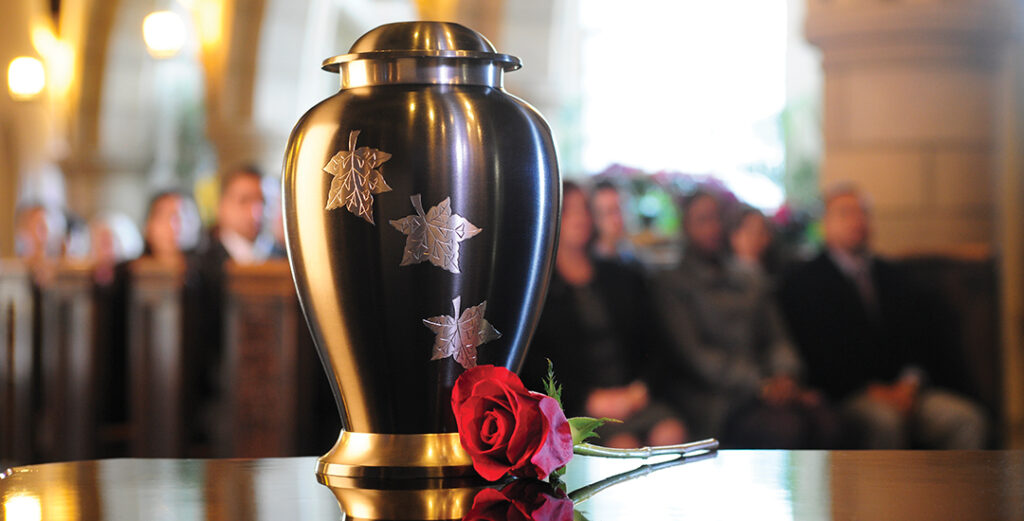
Cremation services accounted for 73.1% of dispositions in Canada in 2019. The percent of Canadians choosing cremation is still growing. Families still have questions about cremation. Questions about cremation prices, legal aspects about cremation authorization, and what happens through the whole funeral home cremation process.
What cremation service options are offered?
There are basically 3 main cremation service options. Although, any cremation service can be personalized however the family choose.
Cremation Funeral Service
This service option is most similar to a traditional funeral service. The deceased may be present at the funeral ceremony in a casket or coffin. After the funeral service, the deceased is transferred to the crematorium for cremation. The cremated remains are returned to the family, or interred in a cemetery plot or cremation niche. Or, the family may choose to keep the ashes in an urn at home or conduct an ash scattering memorial.
Cremation Memorial Service
This differs from a Cremation Funeral in that the deceased is first cremated at the crematorium, and then a ceremony may be held with the cremation urn present. It is typically referred to as a ‘memorial service’ as the body of the deceased has been cremated, and the service is being held in memory of the deceased. As the cremation has already been conducted, there is no time-frame element of when this type of service is held. However, it is generally held immediately after the cremation, and often at the funeral home or a place of worship. But, a cremation memorial service can be held anytime and anywhere.
Direct Cremation Service
A direct cremation is when the deceased is cremated with minimal services offered by the funeral home. It is often referred to as a “simple cremation”, “basic cremation”, “just cremation”, or “economical cremation”.
It is considered a ‘no fuss’ cremation alternative, where the disposition of the deceased is managed, no service or ceremony held, and the cremated remains returned directly to the family. (If they so wish). It is the least expensive cremation service option. And it is growing in popularity as an option. Largely as people are choosing affordability, simplicity, and low cost.
Choosing a direct cremation means the immediate need to conduct the disposition of the body is handled in a speedy and inexpensive manner. A family can always decide what to do about memorializing at a later date. This can sometimes make it easier for families to deal with the initial bereavement and hold a memorial service when they feel ready.

How much does cremation cost?
This is probably the most frequently asked question today. In the past, the funeral industry has rather hid behind the taboo of death and used lack of knowledge and overwhelming grief to bamboozle bereaved families. For many decades there has been a lack of open funeral price disclosure. The Internet began to change how funeral homes operated, even though many still do not include prices on their websites.
The cost of a cremation will vary. It will depend on what type of cremation service (as options above), and the funeral service provider selected. The cost for the same type of cremation service does differ between funeral homes and crematoria.
And this is why we get so many website visitors asking “how much does a cremation cost?”
As a general price guide, you can expect to pay between $900 and $2,000 for a basic direct cremation service package. This is why it IS important to compare a few cremation prices before you make a decision. We all agree that cheapest is not necessarily best, but why pay hundreds or thousands more for the same service?
The average cost for a cremation funeral service is more likely to range between $4,000 and $6,000, depending on the ancillary services and products purchased.
Visit DFS Memorials to find affordable direct cremation providers near you and what they charge for a direct cremation service.
Are there extra charges added to a low-cost cremation service?
There can be additional charges added to a basic cremation price. Some funeral homes advertise what appears a low-cost direct cremation, but there can be ‘hidden’ fees that can potentially add on a few hundred dollars extra. So, be sure to check what is and is not included.
Here are some of the extra charges which may be applied:
- If a residential collection is required (deceased is not at a hospital or medical/nursing location).
- If the deceased weighs over 250 pounds.
- If a pace-maker needs to be removed before cremation
- Requesting an expedited cremation.
- Choosing a cremation urn (a basic temporary urn is usually included)
Do I need a casket or coffin for a cremation?
No. You do not have to purchase a casket or coffin for cremation. A suitable rigid cardboard or plywood cremation container is all that is legally required. It is more common to require a coffin if a funeral service is being held before the cremation. Some funeral homes will offer a rental casket for this purpose.

What happens when a body is cremated?
Cremation is the process of reducing a body to ash and bone with intense heat and flames. The remaining ashes and bone fragments are then pulverized to produce the fine granular remains into what are referred to as cremated remains or cremation ashes.
How long does cremation take?
Typically, it takes around 3 hours to perform a single cremation. More modern cremation retorts are capable of shorter cremation times. The funeral home or crematorium will need to schedule a cremation once all the required authorizations and permits are obtained. It usually takes 7 – 10 days for the funeral home to handle everything, and schedule the cremation.
What happens if the deceased had a medical implant?
If the deceased had a pace-maker this will need to be removed prior to the cremation. This is because a pace-maker has parts that may explode if exposed to intense heat. Other medical implants such as artificial hips, medical pins, etc. can be cremated safely.
Can an obese person be cremated?
Yes. However, you will need a crematorium that can process a barometric person. This requires a larger retort with a wide entrance and extra support. Additional lifting equipment and a larger cremation container are needed, so this can mean that a cremation for someone considerably obese can result in additional charges.
Who can authorize a cremation?
Determining who has the rights of disposition can sometimes prove contentious. Especially so with cremation as it is such a final act of disposing of a body and all DNA. The law states that first rights go to a personal representative as named in the will. Following that the rights pass in a hierarchy of next of kin. Passing to the legal spouse, adult children, adult grandchildren, parents, siblings, and other adult next of kin.
If you opt to pre-arrange a cremation plan for yourself, you can pre-sign an authorization for cremation. This can simplify the process when the time comes, and save your next of kin the task of authorizing.
Ensuring identification of the deceased
An important aspect of the cremation process is ensuring the ID of the deceased throughout the whole process. Surviving families need reassurance that the remains they receive are definitely the remains of their loved ones. The next of kin identify the deceased and a unique metal ID tag is usually then attached to the deceased. This tag is checked and monitored through steps at the crematorium to maintain ID records. The tag is cremated with the individual and is kept with the cremated remains.

What can we do with the cremation ashes?
Cremated remains are organic sterile matter and pose no harm to humans or the natural world. Once your loved one’s remains are ready, you can collect the urn from the funeral home, or make arrangements for the cremation urn to be interred.
There is so much flexibility with cremation in terms of what you can choose to do with the ashes. It is becoming more popular to conduct ash scattering ceremonies and create cremation artifacts (diamonds, glass paperweights, garden ornaments, etc.)
You do not have to make a decision immediately. Sometimes it helps to keep the ashes for a while until you feel ready to decide.


3 thoughts on “Cremation Services Explained”
Comments are closed.